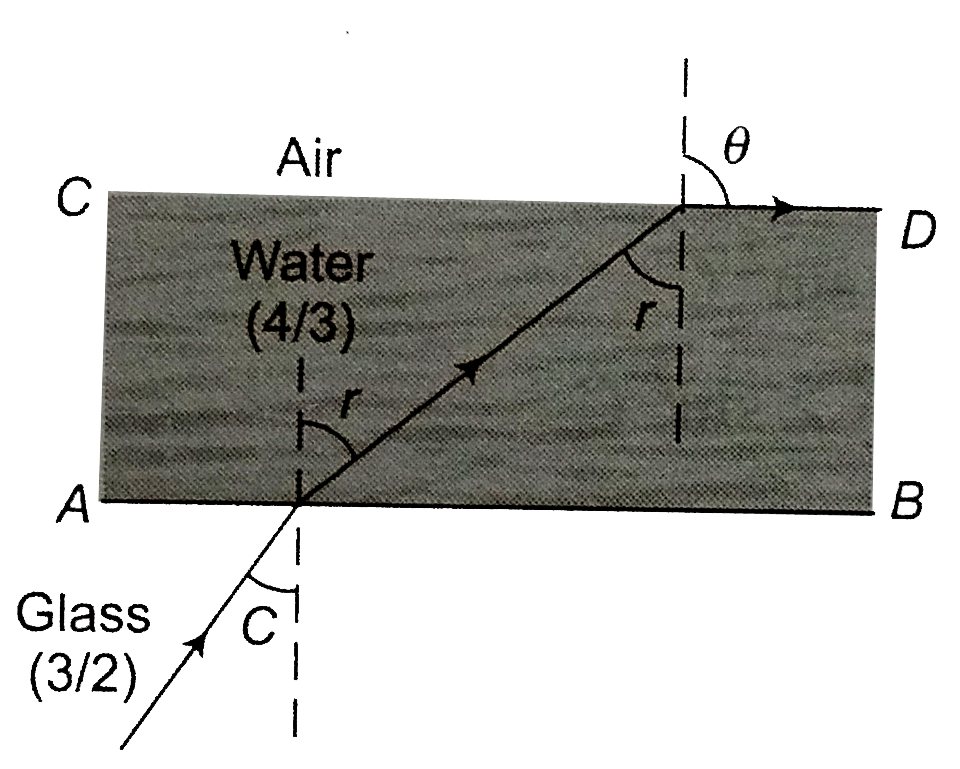A ray of light traveling in glass (μ=3/2) is incident on a horizontal glass-air surface at the critical angle θC. If a thin layer of water (μ=4/3) is now poured on the glass-air surfac, the angle at which the ray emerges into air at the water-air surface is

Critical angle for glass-air surface
μgsinC=1×sin90∘
sinC=1μg=13/2=23
Refraction at AB
μgsinC=μωsinr
32⋅23=43sinr
sinr=34
Refraction at water-air surface
μωsinr=1×sinθ
43×34=sinθ=1
θ=90∘
The ray will emerge parallel to water-air surface.
Topper's Solved these Questions
- REFRACTION OF LIGHT BY PLANE SURFACESBOOK - CP SINGHCHAPTER - REFRACTION OF LIGHT BY PLANE SURFACESEXERCISE - Exercises
110 Videos
- REFRACTION AT SPHERICAL SURFACESBOOK - CP SINGHCHAPTER - REFRACTION AT SPHERICAL SURFACESEXERCISE - EXERCISES
105 Videos
- SEMICONDUCTORSBOOK - CP SINGHCHAPTER - SEMICONDUCTORSEXERCISE - Exercises
140 Videos
Similar Questions
A ray of light travelling in glass (μ=3/2) is incident on a horizontal glass air surface at the critical angle θC. If a thin layer of water (μ=4/3) is now poured on the glass air surface, the ray of light emerge into air at the water air surface at an angle of π/k, radians find the value of k.

View SolutionA ray of light travelling in glass (μg=3/2) is incident on a horizontal glass-air surface at the critical angle θC. If a thin layer of water (μw=4/3) is now poured on the glass-air surface. At what angle will the ray of light emerges into water at glass-water surface?
View Solution
Knowledge Check
A ray of light travelling inside a rectangular glass block (μ=√2) is incident on the glass-air surface at an angle of incidence of 45∘. The refractive index of air is 1. The ray will
Aemerge into air without any deviationBbe reflected back into glassCbe absorbedDemerge into air r=90∘A ray of light travelling from glass to air is incident at 50∘ from the glass air boundary . What is the angle of deviation if the critical angle is 42∘ ?
A0∘B60∘C80∘Dsin−1[sin50∘1.5]−50A ray of light travelling in water is incident on its surface open to air. The angle of incidence is θ, which is less than the critical angle. Then there will be
Aonly a reflected ray and no refracted rayBonly a refracted ray and no reflected rayCa reflected ray and a refracted ray and the angle between them would be less than 180degree−2θDa reflected ray and a refracted ray and the angle between them would be greater than 180degree−2θ
A ray of light travelling in air is incident on a rectangular glass slab. What will happen?
View SolutionA ray of light travelling in air is incident on the surface of glass slab at an angle of 40∘. If the ray is deviated through 18∘, determine critical angle for the glass-air interface.
View SolutionA ray of light travelling inside a rectangular glass block of refractive index√2is incident on the glass-air surface at an angle of incidence of 45∘. The refractive index of air is one. Under these conditions the ray will
View SolutionA ray of light travelling in water is incident on its surface open to air. The angle of incidence is θ, which is less than the critical angle. Then there will be
View SolutionWhen light travels from glass to air, the incident angle is θ1 and the refracted angle is θ2. The true relation is
View Solution
